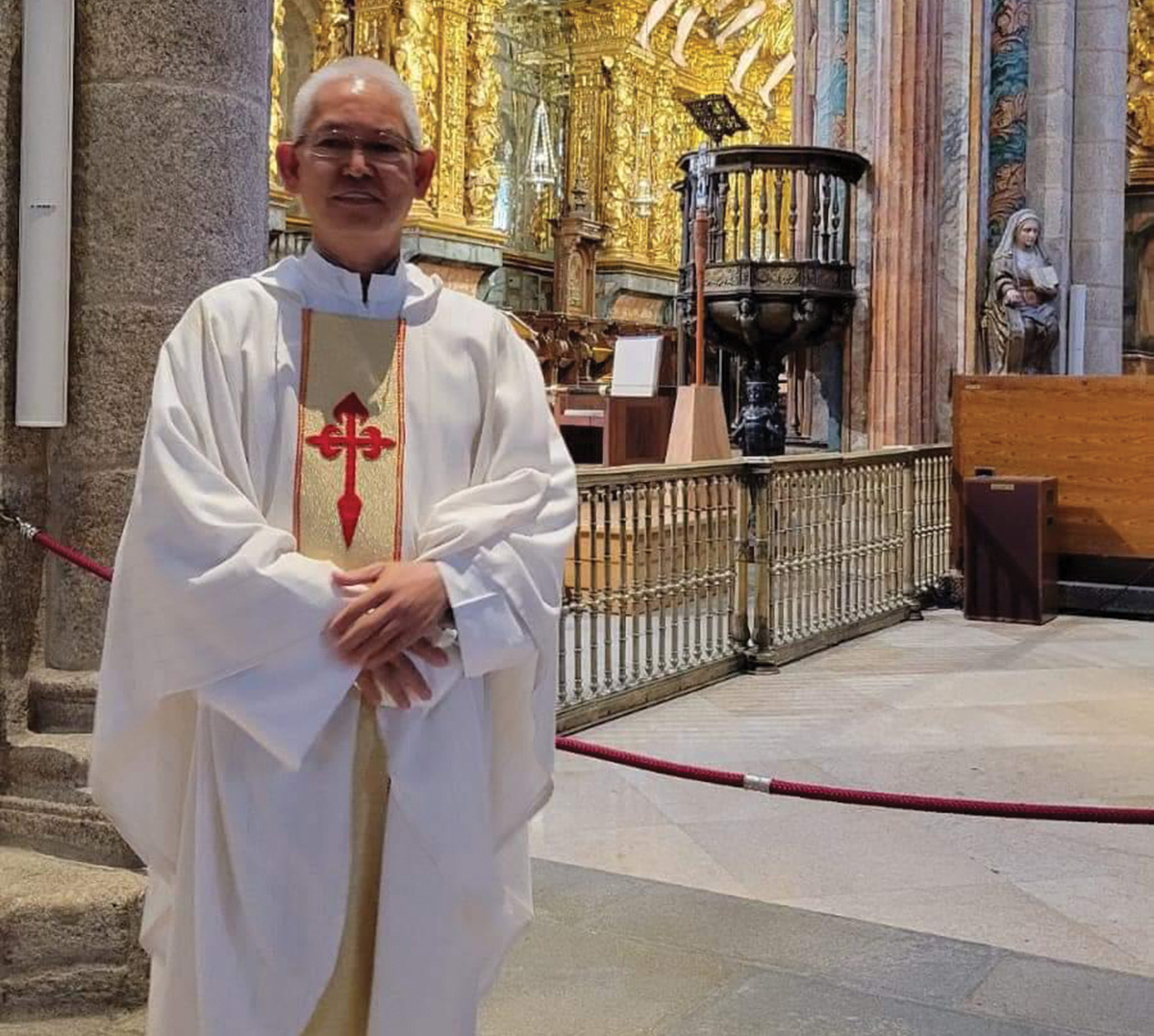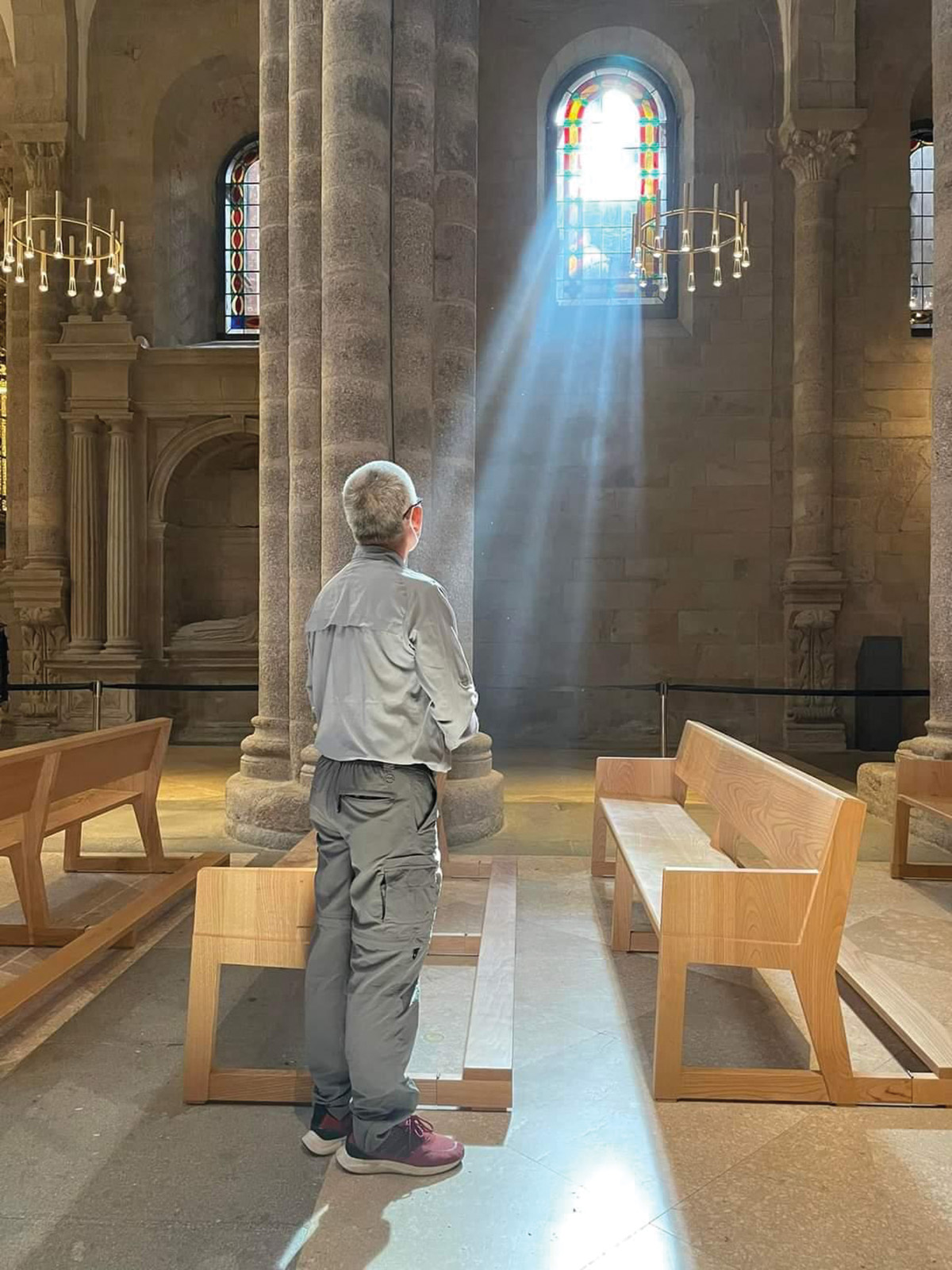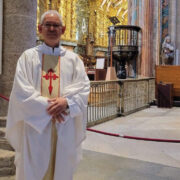
“It is the Lord Jesus whom we meet in the faces of our marginalized and discarded brothers, in the migrant who is despised, rejected, put in a cage, but also in the migrant journeying toward hope, toward a better life.” –Pope Francis, Dec. 4, 2021
As I write this, June 28, 2022, BBC reported on 46 folks who died in the outskirts of San Antonio, Texas. They were found in an abandoned truck, along with survivors “hot to touch,” and suffered from heat stroke, some of whom had come from Guatemala.
I could hear the birds tweeting, as it is dawn, while the sun peeks out to give colors to the gray sky. Notice the pink plumerias have bloomed, as also the dragon plant. Will it bear fruit when left to simply self-pollinate? Could we nurture our growth, without our divine pollinator guiding our paths? For me, not.
The pandemic has claimed 6 million plus folks, worldwide, while 1 million have died in the United States. Did they actualize their dreams? Was God’s dreams for them, realized in their lifetimes?
God’s purpose served by His life, travellng from Congo, LA & Guatemala
A wood sculpture captured my attention with etched wrinkles, a chiseled jaw and a bearded Jesus with a crown of thorns placed on his head. The art conveyed worry to me, and I couldn’t help the contrast I saw then to Fr. Melanio’s face with a reluctant smile. That was 2011.
Ten years later, his face radiates inner contentment and a broad smile that perhaps God’s purpose is being served by his life. He is looking forward to his trip to Guatemala.
He was first assigned to Congo by the Congregation of the Immaculate Heart of Mary (CICM), a Belgian-run religious organization, whose theme is “One Heart, One Soul.”
To get to the Catholic Congolese, he travelled through rivers, forests, and fields and learned French and Lingala.
He heard confessions early in the morning, next to a trap for tsetse flies (which caused the sleeping sickness disease, trypanosomiasis). By sunset, he had ministered to hundreds.
He ate like the Congolese who harvested their produce and caught their game, whether it was antelope, squirrels, deer, alligator, crocodile and snails as big as turtles and catfish from the rivers. Caterpillars were fixed into cassava leaves, now enriched with protein and iron. Cassava flour was mixed with corn flour.
He saw how people made salt: banana peelings were gathered, dried, grass added, burned, filtered, then water evaporated, until only the potassium salt remains. Salt was added to the cassava leaves that have been boiled and red palm oil was added. This became their primary source of food. Given the lack of iodine, the common ailment was goiter, including amoebiasis, trypanosomiasis and AIDS. He transported medicine for AIDS, purchased in Europe by CICM and benefactors. He traveled three to four days, through rough roads and riverbanks and various military checkpoints. That lasted seven years.
On June 12, 2002, 41 religious members of CICM outgrew the organizational structure run by the Belgians, formed a new religious order, called Missionaries of Jesus, (MJ), who believed in being God’s dream catcher for folks in the margins, in the inner cities, in the hinterlands, and far-flung mountains.
MJ’s mission articulates seeing the Face of Jesus in the poor, migrants, refugees, and the marginalized. One of the first supporters was Archbishop Oscar Cruz who helped raise funds for this new religious order, Missionaries of Jesus (MJ), amongst his base.
Fr. Melanio was then assigned to create a Missionaries of Jesus Promotion Office (MPO), a two-year assignment in Precious Blood Church (PBC) in 2007, that lasted 13 years, until his current assignment in Tierra Blanca, eight hours from Guatemala City. He went back for a short holiday break in November 2021 and I had another interview with him.
On a chilly day, we sat in the outdoor gardens of PBC, near a lima tree, full of hanging fruits, a breed of lemon and lime, with a mild lime taste, and a light green color. It was a lovely scent, until the ambiance was abruptly disrupted by loud swearing sounds, from a mentally ill homeless guy, screaming his grievances.
Fr. Melanio shared his belief: “it is to discover, to recover, to uncover the hidden face of Jesus in every person scarred by impoverishment, indifference, and injustice.”
I wondered if we saw the face of Jesus in this homeless guy, what would PBC do? Would they disrupt his street living conditions and call LA City Hall to touch his life to get him off the streets, provide mental health services and perhaps help him in the process to find himself?
Pete Avendaño, a musical director of St. Genevieve, and prior, Immaculate Heart of Mary Church in Los Angeles and PBC, shared: “Fr. Melanio has dedicated himself to being a missionary of the Catholic Church. He has given his life to be a spiritual father to a lot of people wherever he is assigned.”
I wondered how one becomes a father to many? What cultural skills did he use?
A Culture’s Iceberg: Accessing doors of language, food, shared stories
If culture were an iceberg, and the tip is touched by sharing food, how do we immerse in another’s culture, I asked? Without losing a beat, Fr. Melanio spoke of entering the first door of language: “I need to brush up on Spanish to reach the Spanish-speaking villages, twelve of them, much later an Indian Mayan language, spoken in 38 villages, Q’eqchi.”
Ma sa salá chool? – How are you, is about asking if there is contentment in your heart? It is not a simple hello, it is a greeting connecting one’s heart to another.
He conducted Advent retreats in 12 Spanish-speaking villages. After, one notices their smiles and a sense of satisfaction in receiving a certificate of completion, and now validated, they are tasked with a mission to evangelize others.
Tierra Blanca’s (TB) weather is 86°F, with 65% humidity. Intermittent rains degrade roads, mostly unpaved, muddy, and bridges washed down by floods. As motorbikes daily traverse, pockmarked surfaces are common. While on a motorbike, he carried his mass book, the vessels for the eucharist, vestments, and on the way back, generous gifts of rice, coffee beans, produce, and sometimes, chickens that he has to balance in his lap, so as not to suffocate them on transport. Kindness becomes lap luggage. But he is a passenger, dependent on others’ schedules, which prolongs his day into night.
Not only must Fr. Melanio prepare his homily, he wants to teach them how to read and write, and uses the Bible as the instrument of learning. His principle is “Yes, they are poor, we accept that, but what can we do to address basic needs, like reading?” He was certain he could find enough leaders amongst those who had returned to TB, who worked in the U.S., saved dollars, and now have farmlands.
Aside from celebrating masses, hearing confessions, he and Fr. Arsen, the parish priest fluent in Q’eqchi who ministers to the 38 villages, divide up their daily chores of marketing for fish, coffee, cooking, and laundry. Exposed to the elements, clothes stay wet and do not get dry, from intermittent rains.
He told PBC’s parishioners about TB’s conditions and parishioners were moved to donate generously. Within months, the space was built that now doubles as a hall for bible studies, and a space for drying clothes.
With that first door of language opened, it is now easy for Fr. Melanio to enter the second door of sharing food with families.
In TB, corn and cassava are grown. Prayers were offered to thank for a bountiful corn harvest, from which tortillas were made. Daily staples are beans and corn, and for guests, like the priests, they are served caldo de pollo with cilantro, onions, and other spices. If three villages are visited in a day, that would mean three bowls of caldo de pollo, multiplied by several days, one ultimately desires fish, pescado for dinner.
With two doors opened for him to enter, a third door of sharing life stories comes next.
Fr. Melanio came across a family with two teenage boys, whose life is spent in a wheelchair, helped by their mother. Another sibling is Livni, a 14-year-old girl whose life’s dream is to help out her father, the only worker on their farm, and for her to quit school, go to the U.S., and work. Livni was offered a scholarship so she can go to school full time, but the family’s dreams of helping their plight by Livni’s migration had been set in motion. Can you imagine perhaps the fear of Livni travelling by herself, connecting to the coyote, the transporter, from one border to another?
It got me looking at the wabi-sabi art of the Japanese where they find beauty in things that are imperfect, impermanent, and incomplete, of things modest and humble and unconventional.
If we apply these same eyes of seeing the face of Jesus in these migrants, seeing beauty in these poor families who live off their farmlands, to support their families, would we perhaps volunteer to train them in better sharecropping so that the farmlands are devoted to more than two crops of corn and cassava, to grow higher-value crops like coffee, and high value produce like agave for sugar alternatives? All of course, would require agricultural training and technology to generate these high-value products. Consider even a motorized wheelchair so the two boys are mobile and can assist with some chores or fieldwork?
Could reflecting on God’s favor as one ministers to poor folks turn their lives into sustainable, prosperous ones?
Pope Francis wrote on January 23, 2022 to let us try to excavate our memories. Instead of simply looking, look for signs of God’s presence in our lives.”
“What are the hints of his presence, “ Pope Francis asked, “that God has allowed us to experience His love, which he has allowed me to feel His tenderness?”
Might even the poorest of the poor see themselves as with potential to develop?
I asked Fr. Melanio to share God’s favor in his life. He had three examples, two favoring him with what matters to him most, and one for MJ.
While on a pilgrimage to Medjugorje, near the border of Croatia, he was stopped by Dubrovnick’s immigration officials. He was asked to return to Vienna, his last destination, accompanied by two policemen, he gave his passport to the pilot and exited the plane, to return to Vienna.
When he reached Vienna, he got back his passport and sought lodging at the first hotel he found. The front desk staff inquired as to the group he was travelling with, a usual pattern with priests travelling. He explained what happened. The staffer consulted his supervisor,

Photo courtesy of Fr. Melanio Viuya
and said: “your stay for three days will be 50% off and all your food in the hotel will be on the house.” He then remembered that a fellow pilgrim called out, as he exited the plane: “Look for Nenita Reguinding.”
Vienna has a population of close to two million, which would be like searching for a needle in a haystack. Nenita happens to be this hotel clerk’s godmother. The long and short of it, Fr. Melanio got a tour of Vienna, celebrated Sunday mass and the community gave funds to benefit MJ’s needs.
When God gives you a detour from what you had planned, accept it, as who knows – it just might be a shower of unexpected blessings.
Several days later, Fr. Melanio got reconnected with the group of pilgrims that he was to lead.
Second God’s favor – he was invited to go to the US, after studying in Rome, he had a three-year religious R1 visa. He was travelling back and forth. By the third year, with six months to spare, he came from the Philippines, passing through Guam, to go to the U.S. In Guam, he was stopped, and advised by an immigration officer who explained the rules, including his qualification to have another renewal, provided he goes back to the Philippines, seeking visa renewal there, before coming to the U.S. He got a tourist visa to go to the U.S., but went back, lined up at the Philippine Embassy, and his visa was renewed for five years. That renewal qualified him to be petitioned by the Archdiocese of Los Angeles’s Cardinal Mahoney for a green card, and ultimately a path to US citizenship.
Third God’s favor – MJ has a goal of having a center at the border to Guatemala, but in Texas. Missionaries of Jesus’ nuns already have a center there but, the institution requires sustenance for the future, with staffing and funds. A plan is now in place to nurture this God-given gift of collaboration and for the center to be sustained. God ultimately finds you to do His plan.
Do you get a sense from Fr. Melanio’s reflections that God’s gifts are overflowing in kindness, generosity, and tenderness? Could we perhaps do the same reflections in our own lives, open our hearts and say, “How are you? Is your heart content?” to the strangers amongst us, and invite them to enter our hearts?
* * *
The opinions, beliefs and viewpoints expressed by the author do not necessarily reflect the opinions, beliefs and viewpoints of the Asian Journal, its management, editorial board and staff.
* * *
Prosy Abarquez-Delacruz, J.D. writes a weekly column for Asian Journal, called “Rhizomes.” She has been writing for AJ Press for 13 years. She also contributes to Balikbayan Magazine. Her training and experiences are in science, food technology, law and community volunteerism for 4 decades. She holds a B.S. degree from the University of the Philippines, a law degree from Whittier College School of Law in California and a certificate on 21st Century Leadership from Harvard’s Kennedy School of Government. She has been a participant in NVM Writing Workshops taught by Prof. Peter Bacho for 4 years and Prof. Russell Leong. She has travelled to France, Holland, Belgium, Spain, Portugal, Japan, Costa Rica, Mexico and over 22 national parks in the US, in her pursuit of love for nature and the arts.






